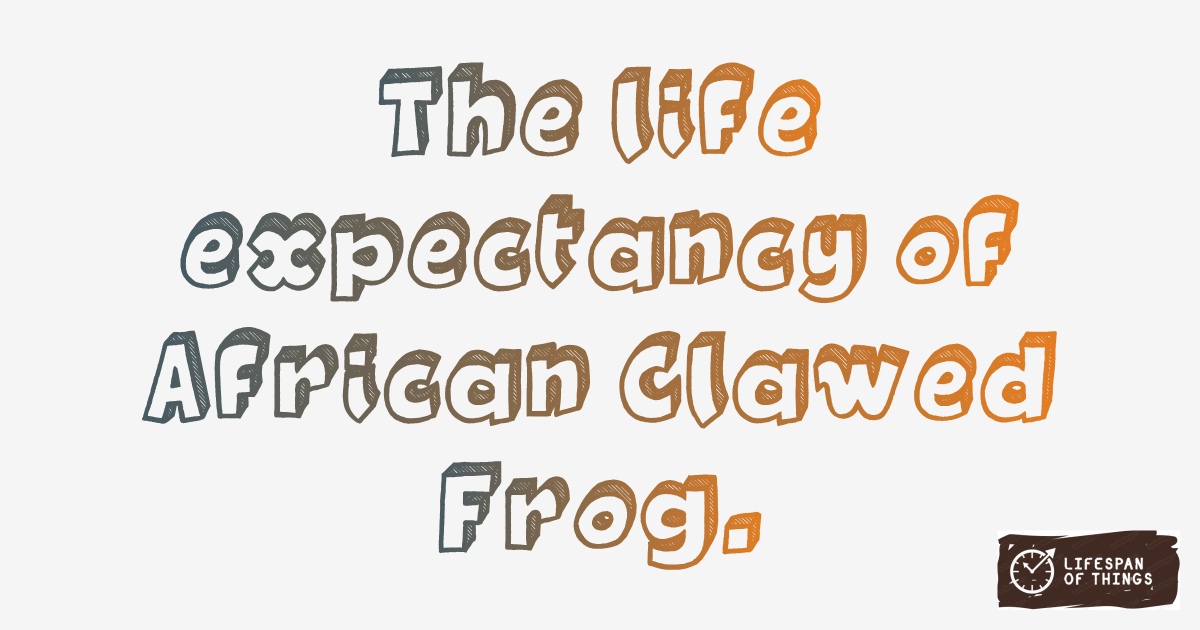
5 - 10 Years
Lifespan of African Clawed Frog is 5 - 10 Years. Factors influencing the lifespan of African Clawed Frog include diet, habitat quality, water cleanliness, and temperature consistency. Maintaining a balanced diet, providing a suitable environment, clean water, and stable temperature can positively impact their longevity.
Useful Information
African Clawed Frogs are aquatic amphibians that thrive in freshwater habitats such as ponds, lakes, and slow-moving streams. They require clean water with minimal pollution and abundant aquatic plants for shelter. Temperature stability is crucial for their well-being, as they prefer warm waters to support their metabolic functions.
African Clawed Frogs are carnivorous and primarily feed on live or frozen foods such as bloodworms, brine shrimp, and commercial frog pellets. Their diet should be rich in protein and supplemented with essential nutrients to ensure optimal growth and health. Overfeeding should be avoided to prevent obesity and related health issues.
To maintain the health and enhance the lifespan of African Clawed Frog, regular water quality checks and tank cleanings are essential. Providing a varied and balanced diet, along with appropriate aquatic plants, can promote their overall well-being. Avoiding sudden temperature fluctuations and ensuring adequate filtration in the tank can also contribute to their longevity.
African Clawed Frogs exhibit nocturnal behavior and are generally solitary in nature. They are not trainable in the traditional sense but can become accustomed to their owners' presence over time. Gentle handling and minimal disturbance in their habitat are key to reducing stress and promoting their natural behaviors. Avoid handling them excessively to prevent unnecessary stress.
Discover the fascinating behaviors exhibited by frogs, from jumping and swimming to unique vocalizations. Read more
African Clawed Frogs are not considered endangered in the wild, but their populations may decline due to habitat destruction and pollution. Conservation efforts focus on preserving their natural habitats and raising awareness about the importance of freshwater ecosystems. Maintaining clean water sources and advocating for habitat protection can help safeguard the future of African Clawed Frogs.
Lifespan Comparisons
| Compared Item | Comparison Description |
|---|---|
| Lifespan of Opossum | African Clawed Frogs typically live longer than Opossums, offering more years of companionship. |
| Lifespan of Parrots | Parrots outlive African Clawed Frogs by a significant margin, providing a century of colorful charm. |
| Lifespan of Raptors | Raptors have a shorter lifespan compared to African Clawed Frogs, making them less enduring companions. |
| Lifespan of Waterfowl | Waterfowl live longer than African Clawed Frogs, thriving in watery habitats for more years. |
| Lifespan of American Bullfrog | American Bullfrogs and African Clawed Frogs share a similar lifespan, both offering years of amphibious presence. |
| Lifespan of Poison Dart Frog | Poison Dart Frogs and African Clawed Frogs have comparable lifespans, each bringing vibrant hues to their environment. |
| Lifespan of Tree Frog | Tree Frogs and African Clawed Frogs share a similar lifespan, making them equally fascinating additions to any habitat. |
| Lifespan of Glass Frog | Glass Frogs live as long as African Clawed Frogs, both providing a transparent view into nature's wonders. |
| Lifespan of Epoxy Resins | Epoxy Resins have a lifespan similar to African Clawed Frogs, serving as durable materials for various applications. |
| Lifespan of Polyurethane (PU) | Polyurethane outlasts African Clawed Frogs in durability, offering versatility for different projects. |
| Lifespan of Bakelite | Bakelite lasts significantly longer than African Clawed Frogs, ensuring longevity in various applications. |
| Lifespan of Melamine | Melamine's durability surpasses that of African Clawed Frogs, providing lasting performance in daily use. |
| Lifespan of Phenolic Resins | Phenolic Resins have a longer lifespan compared to African Clawed Frogs, ensuring lasting stability in different settings. |
| Lifespan of Polylactic Acid (PLA) | Poly(lactic Acid) (PLA) has a similar lifespan to African Clawed Frogs, offering eco-friendly solutions for various needs. |
| Lifespan of Polyhydroxyalkanoates (PHA) | Polyhydroxyalkanoates (PHA) share a similar lifespan with African Clawed Frogs, providing sustainable alternatives for various applications. |
Frequently Asked Questions
Lifespan of African Clawed Frog is 5 - 10 Years.
To create a suitable habitat, ensure clean water, aquatic plants for shelter, and stable warm temperatures in the tank.
Feed your African Clawed Frog a diet rich in protein, including bloodworms, brine shrimp, and commercial frog pellets.
Regular tank cleanings and water quality checks are essential to maintain the health of your African Clawed Frog.
African Clawed Frogs are generally solitary in nature and should be kept individually to prevent stress and aggression.
African Clawed Frogs face threats such as habitat destruction and pollution, which can impact their populations in the wild.








